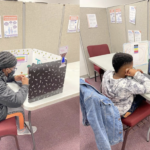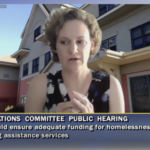Clinics, nonprofits step up to meet needs of expectant mothers during pandemic
In the past year, providers of prenatal and childbirth care have had to adapt to health restrictions while trying to address the added difficulties that the pandemic has created for new mothers.

Yale News
The series of challenges expectant mothers face during the pandemic — health concerns, social isolation and increased financial strain — are unprecedented. To confront these obstacles, medical providers and nonprofits across New Haven have adapted care strategies to meet mothers’ needs.
The sensitivity of prenatal and childbirth-related care inhibits any complete transition to the telehealth model that has become increasingly common since the onset of the pandemic. Medical clinics and nonprofits across New Haven have had to find ways to adapt maternity services to meet public health guidelines — shifting some programs to virtual settings and developing vigilant strategies to ensure patients’ safety.
“There are a lot of burdens on women in the prenatal and postnatal period that I think have always been there, but that are really accentuated now in the context of pandemic society,” said Benjamin Oldfield, chief medical officer at Fair Haven Community Health Care, or FHCHC.
Oldfield told the News that he has noticed “upticks, locally and nationally” in the prevalence of many social conditions that negatively impact pregnant women. In particular, he emphasized that the economic difficulties brought upon by the pandemic have led to higher rates of substance abuse and domestic violence. Expectant mothers are already one of the highest-risk groups for domestic violence, so this trend is extremely worrying for maternity care providers, Oldfield said.
Social isolation has also taken a toll on the mental health of new mothers, according to Oldfield, who added that pregnancy and caring for a newborn are, even in normal times, isolating experiences.
With in-person daycare facilities closing and schools in the district going virtual, new mothers with other children at home have also had to balance their own well-being with increased child care responsibilities. This has been a major roadblock for women who are seeking maternity care, according to Nieja Jackson, program coordinator for New Haven Healthy Start.
Healthy Start is a nonprofit that works to reduce infant mortality rates in New Haven and lessen the racial and ethnic disparities in those figures. The organization does this by connecting at-risk expectant mothers with the resources they need: doulas, medical insurance, transportation to appointments and housing services, among other services.
Most clinics have adopted a temporary safety policy preventing visitors from joining patients during appointments, Jackson said. She added that she believes that this policy has led to a higher rate of missed appointments among lower-income pregnant women with younger children, because they are unable to bring their children to the doctor with them but also cannot afford child care.
Millie Landock, lead community health worker for Project Access — a nonprofit that connects underserved New Haven residents with medical providers — told the News that many of the pregnant women that she works with have struggled with the choice of whether to attend their appointments at all.
“One woman shared that they had to go to a medical appointment, and someone called DCF [Department of Children and Families] because the child was at home,” Landock said. She told the News that the woman had made the choice to leave her child at home to attend her appointment, “because she felt that she had no other option, because she didn’t have a daycare.”
Oldfield told the News that he has anecdotally noticed an uptick in pregnancies during the pandemic, which he attributes to the effects of stay-at-home orders.
Natasha Ray, director of Healthy Start, echoed this, saying she has seen a greater volume of requests for referrals and connections to “community resources, such as: food pantries, diapers, employment opportunities and most importantly, accurate health information.” The women that Healthy Start supports have also demonstrated an increased need for mental health support, she said, due to anxieties about the pandemic and its hardships.
Maternity care — from prenatal visits to infant health check-ups — is currently being provided in a hybrid model at clinics like the Fair Haven Community Health Clinic. Expectant mothers attend necessary face-to-face appointments with doctors and midwives, but less urgent visits are conducted through telemedicine.
At the Fair Haven clinic, visits for pregnant women and their babies are conducted at a separate site designated for “well-care,” meaning care for healthy patients not exhibiting COVID-19 symptoms. According to Oldfield, social distancing is enforced in waiting areas, rooms are disinfected between patients and care providers are required to wear PPE.
Ray told the News that Healthy Start has been offering its services through a combination of in-person and telehealth visits. At the height of the pandemic, Healthy Start doulas had to meet virtually with the mothers that they assisted, which Ray said “disrupted” interpersonal relationships.
Since then, a decrease in the rate of COVID-19 infections has allowed for more in-person contact to resume. Hospital policies have now adjusted to allow for doulas to attend births and check in on women who have recently delivered. Healthy Start’s group parenting classes are currently still offered online.
As a new measure to expand their services, Healthy Start has also partnered with and provided funding to the Yale School of Medicine’s Community Health Care Van. This mobile medical unit now provides safe and accessible maternity care, pediatric health care and connection to other resources free of charge, Ray said.
“The pandemic coupled with racial and ethnic health disparities has been the greatest challenge,” Ray wrote in an email to the News. “The mobile medical unit provides medical maternal-infant care to communities that suffer from highest COVID-19 disease burden and that have suffered long-standing decreased access to care.”
New Haven Healthy Start is a federally-funded program that has been located at the Community Foundation for Greater New Haven since 1997.
Sylvan Lebrun | sylvan.lebrun@yale.edu










